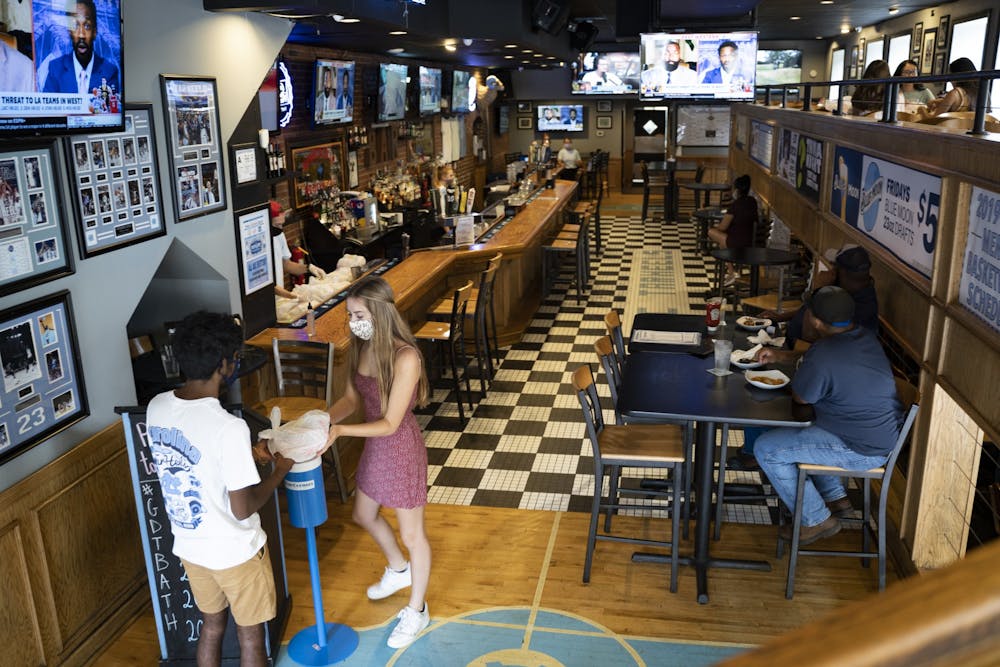“It’s tough, that’s all I can keep saying,” Bawcom said. “All you can ask for is for the people to understand that the majority of places on Franklin Street right now are trying to stay open. We try to be as safe as we can for the patrons who come in and we try to make them feel comfortable, but at the end of the day, you understand why they don’t.”
People’s fears about eating out are certainly understandable, with many states across the country — including North Carolina — experiencing an uptick in positive COVID-19 tests. In order to limit viral spread, Orange County has implemented the standard precautions, such as limited occupancy of restaurant dining rooms and, most recently, a ban on the sale of alcohol after 10 p.m.
With the limitations placed on the service industry, some restaurateurs — like Christopher Carini, the owner of Linda’s Bar & Grill — have tried to monetize their businesses in other ways. Linda’s has begun offering large-scale, family-style food deliveries, and is also hoping to begin an electric-bike delivery service. Carini said these new innovations are crucial to surviving the downtick in business.
“If you just sit back and let this take you, that’s just going to take you under,” Carini said. “Everybody will fail if you don’t find a way to survive. It’s survival of the fittest. Even a regular summer puts two or three places out of business.”
One could assume that some of the strains felt by businesses this summer might be assuaged by students returning to campus or athletic season in the fall. Despite this, Carini said he’s afraid of this drought continuing throughout the fall and winter. The reason? He doesn’t believe the University’s reopening plans will last.
“I know it’s slated to happen, but the way things are going right now, you have to look at the way things are spreading,” Carini said. “We’re looking at the peak of what we have seen in our country right now. It’s worse now than it was in March, when I shut the restaurant down completely. And it’s here in the South."
“If the students come back, will there be a boom in business? Yeah, there'll be more people. You know, more people equals more people eating,” Carini said. “So everyone's got to eat. And I’m assuming there’ll probably be already more places shut down. So it makes for more business for the rest of us already here. But again, I just don't see the students returning. And if they do, I probably see them going home early.”
Scott Maitland, the owner of Top of the Hill Restaurant & Brewery, said that even a return of students to campus or an athletic season might not be enough to save Franklin Street’s restaurants and bars from further economic distress. He said the only thing that would truly help business come back is a common feeling of safety among people.
“I think that we would go to town if we felt like it was safe,” Maitland said. “I do think it’s quite possible that we would see an explosion of business. The new normal might even be better than the old normal because people appreciate being in public. But there has to be that feeling of safety.”
Maitland, like Carini, has also employed a bit of creativity in order to generate income during the slowdown, including using TOPO's distillery to make hand sanitizer and selling restaurant-quality meals people could cook at home themselves.
Both Maitland and Carini said that none of those methods can make up for the profitability of a Franklin Street full of hungry and thirsty students and fans. Maitland said that this crisis is a fight for existential survival and many of the unknowns about the upcoming athletic season have left him even more worried.
“When you look at the business, Top of the Hill, people think about football and basketball, but there’s also lacrosse and women’s field hockey and soccer and all of these sports that bring so many people,” Maitland said. “So I’m very concerned about whether we’ll be allowed to open or not, and then what the landscape is going to be like even if we are allowed to open.”
To get the day's news and headlines in your inbox each morning, sign up for our email newsletters.
Sup Dogs owner Bret Oliverio has tried to find a silver lining within the economic uncertainty. He acknowledged that, at his restaurant’s current operating capacity and under current restrictions, it is impossible to make money. However, he was also quick to point out some of the opportunities that could arise thanks to the pandemic.
“My game plan is to stay open,” Oliverio said. “[If] we stay open, maybe by default we’ll have a few customers because a lot of businesses are closed. But if there’s no in-person semester and no football season, it’s just going to be incredibly brutal on any and all businesses, especially restaurants on Franklin Street. You have to be prepared to lose money.”
While UNC and the ACC have announced the return of students and an 11-game football schedule, respectively, things are always subject to change. It’s that same uncertainty that’s been afflicting the country since COVID-19 brought life to a grinding halt in March and the same one making people uneasy about returning to campus or kicking off an athletic season. Despite uncertainty about what the fall semester will look like on Franklin Street, Oliverio said he knows one thing.
“If a restaurant can survive this, then there is no stopping that restaurant,” Oliverio said. “This is the worst-case scenario. So, on a positive note, if a business can survive this, then everything else will be easy going forward.”
@pjdaman12
@DTHSports | sports@dailytarheel.com




